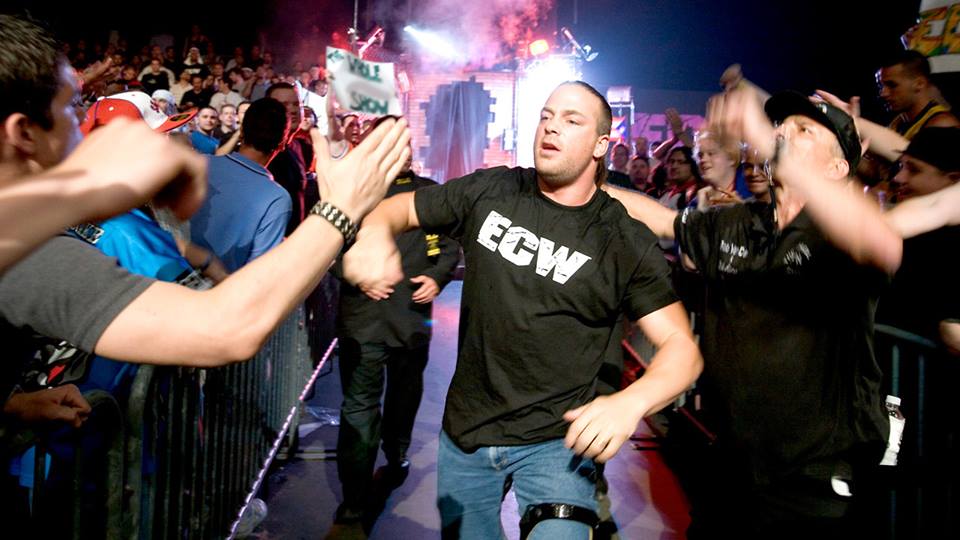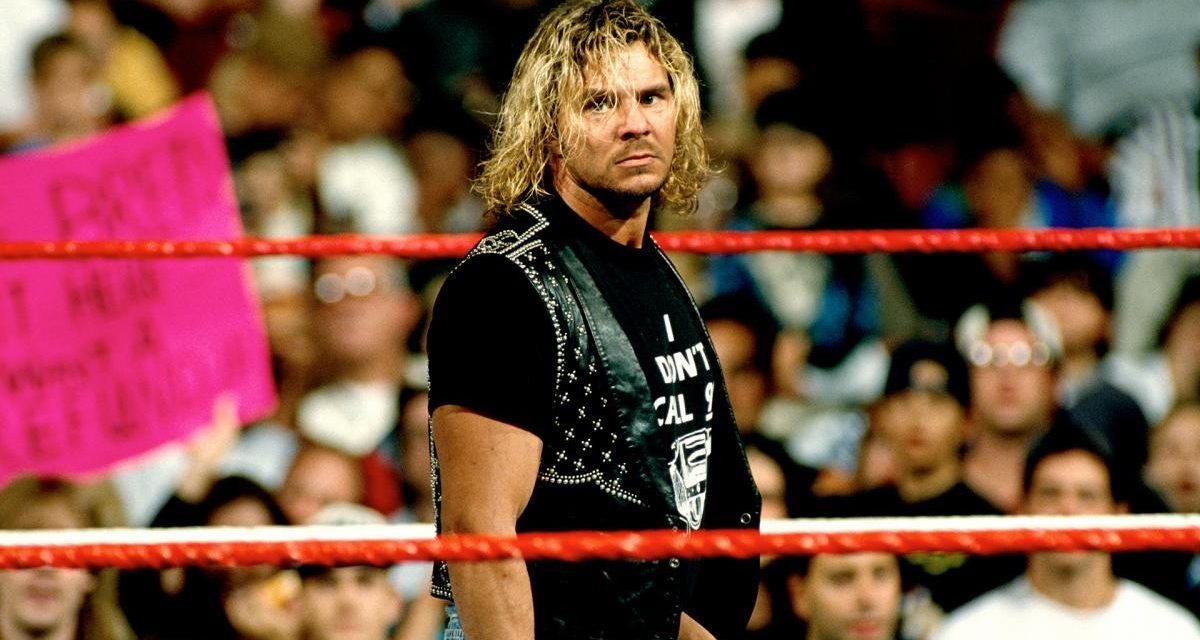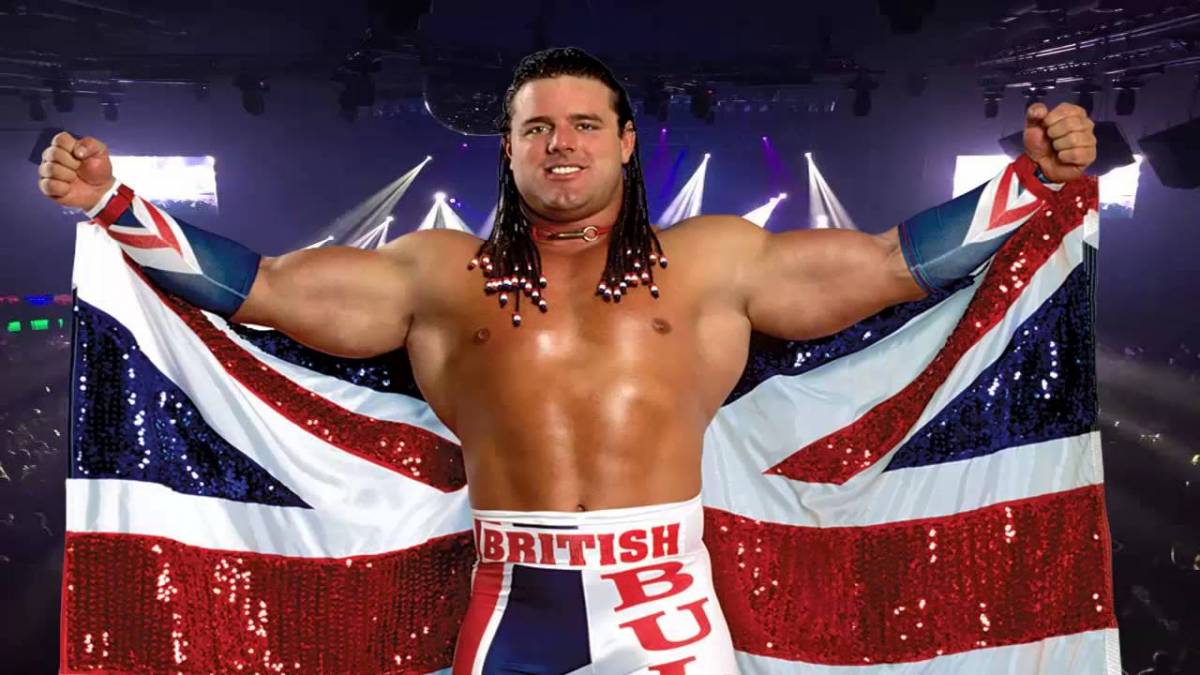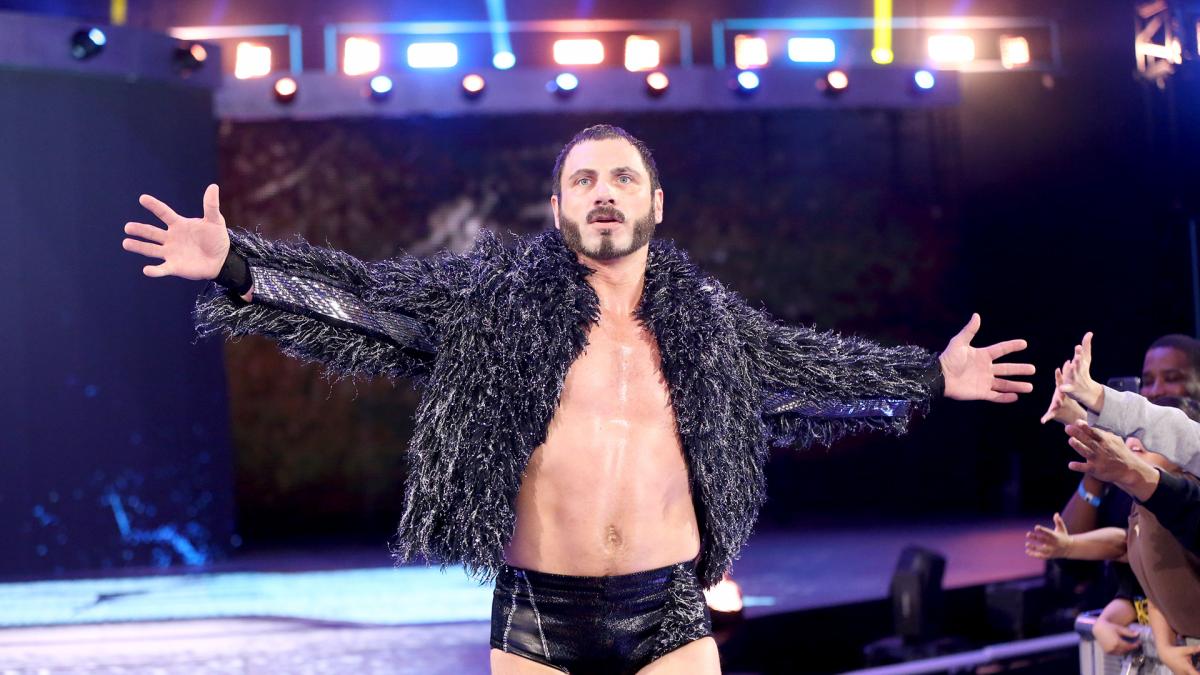Could have, would have, should have. Looking back on WWE’s past and present, there are so many cases where they simply dropped the ball with some of the company’s most promising acquisitions. It’s easy to put the blame on either Vince McMahon, John Cena, Roman Reigns or whoever the least favourite of the month is. But sometimes it’s difficult for every big prospect to connect with a less niche audience, or a fanbase that’s incredibly picky on what defines the modern superstar. So let’s take a look back at the biggest flops and failures we all wish had worked out somehow.
I would like to take a moment to point out how heart-breaking it was writing some of the latter names on this list.
1. Rob Van Dam

Wrestle Stars
We’re starting off this list with someone who was consistently on the verge of being a huge deal on the WWE main roster – the whole f’n show, Rob Van Dam. During his prime, RVD was considered one of the most exciting talents on any given brand, being the hottest product to arrive during the Invasion angle as part of the ECW/WCW alliance.
Even though he suffered the fate of remaining a perennial midcarder for the majority of his career, he remained one of the most over performers, often receiving the biggest and most positive receptions on a nightly basis. After capturing numerous Intercontinental and Tag Team Championships, he eventually was trialled as a main event talent in 2006, following the revival of ECW and his victory in the second ever Money in the Bank ladder match. Defeating John Cena at One Night Stand in an unforgettable main event, RVD finally reached the top of the card as the WWE Champion.
So where did it go wrong?
To put it simply, it was just too damn late. Should this win have happened in 2002/3, the times where Rob Van Dam could have broken barriers before the likes of Eddie Guerrero and Rey Mysterio, then RVD’s title run could have been historic. In 2006, the novelty of Mr. Monday Night seemed to have worn off, after a few too many lost feuds and a lack of presence amongst burgeoning stars like Edge and Randy Orton. RVD’s run with the WWE title lasted merely a month before dropping it to the Rated R Superstar at Vengeance. Van Dam soon fell back into the familiar mid-card veteran’s role, and barely saw light in the WWE main event again.
RVD was granted release in 2007 and found somewhat of a career resurgence during the Hogan/Bischoff era of TNA. Van Dam would occasionally show his face in WWE, feuding with Alberto Del Rio and Dean Ambrose in 2013, but failed to find the same popularity he had going on in his prime. Maintaining good relations with WWE, it’s likely RVD will return again some day for one final hurrah in the Hall of Fame. But it’s a shame he won’t ever be considered a leader for his generation of superstars.
2. Brian Pillman

Voices of Wrestling
The Loose Cannon was a massive part of the shift towards mature content in the 1990s, creating some of the most iconic “forgotten” parts of The Attitude Era, inside and out of the WWE. Pillman can be credited as a pioneer of the Cruiserweight class, competing in fantastic bouts against Rey Mysterio, La Parka and Jushin Liger, while also holding his own with heavyweight personalities like his former partner Steve Austin. Pillman had it all and connected with the new fanbase through his antics, which verged beyond controversial. Yet due to personal issues and having to live in the shadow of others, Pillman didn’t quite break through as a huge star.
Most should recall the segment in which Pillman and his wife were being interviewed from the comfort of their home and all was well, until Steve Austin decided to show up. What followed pushed the boundaries of what WWE could get away with broadcasting. The heated feud reached new levels when Pillman drew a gun on Austin in order to protect he and his wife from Stone Cold’s wrath. The camera’s visuals were cut yet you could still manage to make out the sound of struggles and the eventual climax of what sounded like a gunshot. Drama you would never expect to be seeing from a wrestling show.
Vince McMahon had a lot to answer to following this segment being aired. Television broadcasting companies were unwilling to continue to air such mature scenes, especially when weapons were apparently involved. Although all was played off through Pillman’s character, it was so damn believable that it almost sabotaged the Attitude Era.
Should WWF have capitalised on Brian Pillman’s unstable nature and continued to question limits and push the bar with his antics, then he could have been someone to truly rival the popularity of Austin 3:16 and The Rock. Perhaps if it weren’t for his untimely and unfortunate demise in 1997 this could have happened, but that’s a story for another time. WWE had their chance, but never seemed to get around to it in time.
3. Austin Aries

Cageside Seats
The most recent release from WWE brought much grief to fans of the Cruiserweight division. The arrival of “the greatest man to ever live” was given a ton of fanfare and spelt out an interesting future for the NXT main event scene. But as huge as Aries’ debut was in terms of star power, it paled in comparison to Shinsuke Nakamura (who debuted on the same night). Aries immediately became an afterthought on the roster and failed to ever make it past the occasional midcard feud. His destiny seemed to lie as an enhancement worker, which was a definite misuse of his ability.
I’m the first to admit that it would be difficult for WWE to give due credit to absolutely everyone on the roster, what with so many massive stars now vying for the spotlight and equal footing on the main roster. But Austin Aries found a foot in the door with the ailing Cruiserweight division.
At first, being used as a commentator was an excellent move by WWE. Aries can talk a good game, and suited the role of heel play-by-play perfectly, yet they knew they had a huge star in the waiting once his eye injury had passed by. Austin Aries was plucked from the announcers desk and back into the ring to feud with the Cruiserweight Champion Neville going into Wrestlemania 33 – in what was an absolute belter of a pre-show contest. That feud seemed to just carry on for months on end, coming to a close about a month back with Aries losing 0-3.
And that was the last we’d ever see Aries in WWE, for now anyway.
Austin Aries could have been one of the few stars to bridge the gap between the cruiserweights and the rest of the Raw roster. He had the chemistry to work with bigger guys as a believable babyface or continue to dominate under Neville as a good heel worker. Aries’ star power could have easily translated into over feuds, even if it were just to act as an enhancement talent.
Rumours have surfaced that Aries wasn’t particularly happy with how he was being booked by WWE creative, so in fact the terms of his release were mutual instead of one-sided. Aries will most likely continue to work on the independent scene prior to the release of his book next year, so hopefully this isn’t the end of the road for his career, one that could have been a lot better used in the big leagues.
4. Vader

Youtube
Vader’s run in the WWE was telegraphed to be successful back in the late 90’s, following a historic run as part of World Championship Wrestling and stints in Japan. Having a reputation as an imposing shoot wrestler who could hang with almost anyone, Vince was willing to push Vader straight into the main event scene against then champion Shawn Michaels. All lights were green and “the man known as Vader” debuted as an absolute beast that tore through most of the undercard. He had a significant presence in the 1996 Royal Rumble eliminating the likes of Jake Roberts, Savio Vega and Yokozuna – but was ultimately foiled by HBK.
It seemed written in the sand that Vader was to begin feuding with Michaels, or another established WWF mainstay, but Vader desperately needed to take time off to rehab a shoulder injury he had been nursing since his debut. Vince immediately seemed to lose faith in him as a reliable main eventer and upon his return, left him to stew in multi-man matches.
Vader received a half-hearted second shot at the WWF title picture at Summerslam, but was victim to a disqualification finish and was once again forced back out of the title picture. Even though he and Michaels had a great match, one often heralded as one of the best Summerslam title bouts, backstage politics of the time saw Vader with the short stick, having to continue to prove himself to writers and agents as a product worth investing in.
His latter feuds saw him work with The Undertaker, Kane and Edge prior to his eventual release. Even though he continued to put in consistent performances, Vince was unwilling to push him as the big deal he was touted to be after WCW and NJPW. Vader has since floated around different promotions and managed to recapture his status in All Japan and Noah, but it’s a shame he couldn’t have found a place during his run with the WWE. His image and in-ring ability would have fit in well during the Attitude Era and would have probably seen him through numerous title runs.
5. The British Bulldog

Youtube
UK born folk are experiencing somewhat of a renaissance as part of the WWE roster right now, with the likes of Pete Dunne and Tyler Bate becoming some of the most talked about stars of 2017. Before then, English wrestlers always seemed to have a tough time finding credibility on the WWE roster, with very few managing to make it into the main event scene, usually restricted to Intercontinental/Tag Team title runs at best.
Looking back through the substantial list of English-bred superstars, very few stand out, but one who does is Davey Boy Smith. The British Bulldog should certainly go down as a legend in the wrestling business, being a popular character often found semi-main eventing most WWF cards throughout the 1990s.
Arguably the Bulldog peaked at the 1992 Summerslam event, in which he headlined against brother-in-law Bret Hart and captured his first Intercontinental Championship. Bulldog, already a guaranteed draw overseas as well as a superstar in the States, was set to be a leader in the New Generation after the departures of Hogan, Warrior and Savage. But it was not to be. Once again, Kliq politics and backstage relations held Bulldog back from being the first ever English World Champion and relegated him to be nothing more than a henchmen or occasional mid-card draw during the Attitude Era.
Similar to Bret Hart, Smith developed a bitter attitude towards Vince and the direction WWF was going in, thus departed to WCW to attempt to garner some momentum in their already stacked roster. Despite finding minor success and even reaching contender status for the World Championship, Bulldog once again missed the boat.
Bulldog had the physique (albeit somewhat illegitimately) as well as the personality and the presence to make it as a believable main eventer, who could have made history as the first Brit to break through and make it big in America. Not exactly the toughest of feats for an Englishman, but somehow unachievable in the WWE.
NEXT PAGE
Some of the coverage you find on Cultured Vultures contains affiliate links, which provide us with small commissions based on purchases made from visiting our site.
Some of the coverage you find on Cultured Vultures contains affiliate links, which provide us with small commissions based on purchases made from visiting our site.

